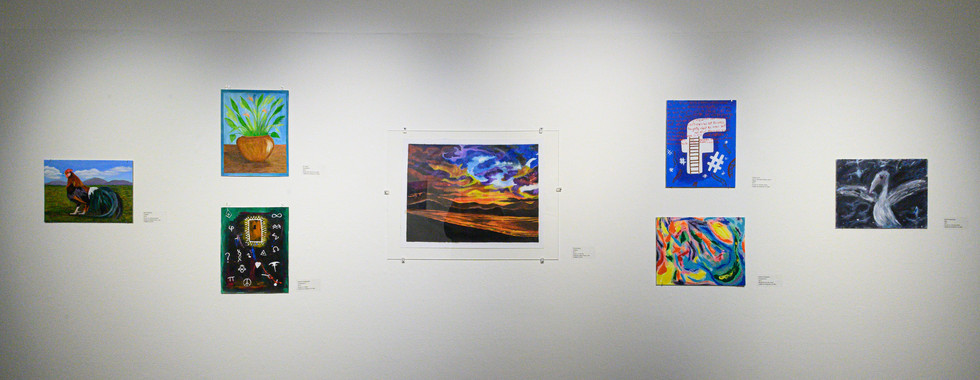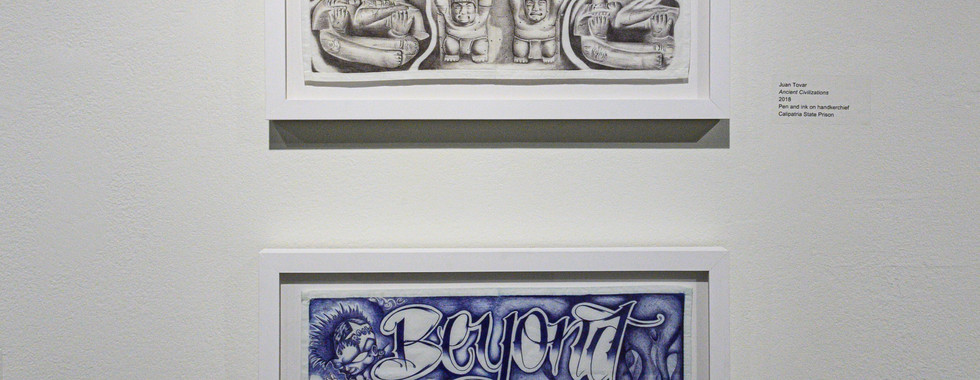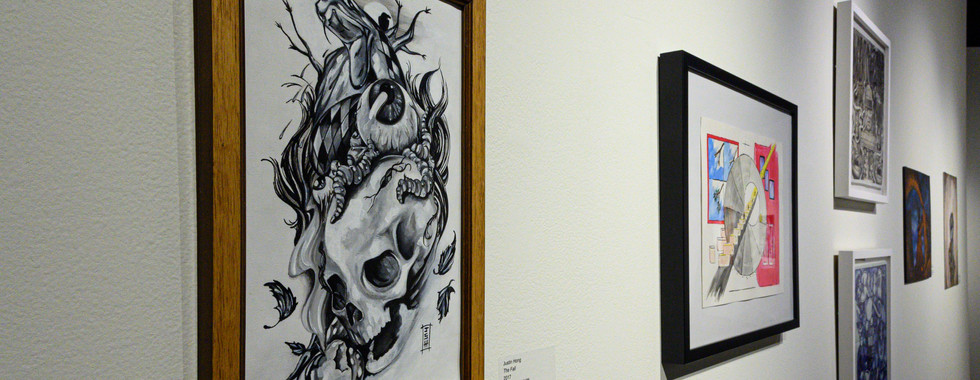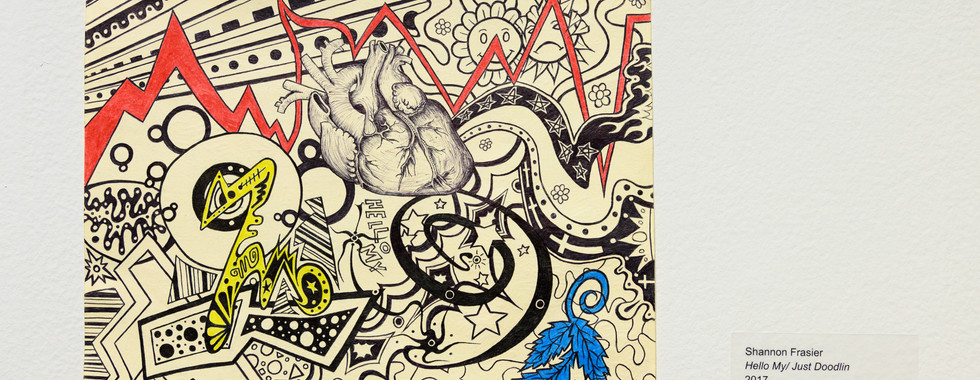Valley College is hosting an exhibit from the Prison Arts Collective program that gives a voice to the incarcerated through their drawings and paintings.
By Aimee Martinez, Multimedia Editor

Valley’s Art Gallery presents the traveling exhibit “Beyond the Blue:” a display of the personal and artistic expressions of individual lives beyond bars.
The art exhibit is part of the Prison Arts Collective (PAC) program in six California state prisons. The program is based in the school San Diego State University of Art and Design at CSU San Bernardino and CSU Fresno. The program uses teachers, students and volunteers to teach art classes to the incarcerated. Various drawings and paintings incorporate themes of alternate materiality, collaboration and partnerships, line as language, dreams, imagination, the surreal and the experience of incarceration. Some of the artwork includes an hourglass with flaming wings, a swan on a rippled lake and a decaying skull with crawling worms.
“Art communicates the pain, the isolation, being a prisoner inside your own mind, being voiceless,” said Next/Up Guardian Scholars Foster Youth program coordinator Alex Ojeda.
At the gallery’s opening, a panel discussion was held with members of the PAC program. Ojeda was one of the panelists whose stories began in prison but found healing through creative outlets. Co-founder of PAC Stan Hunter was 10 years into his sentence at the California Institution for Men when he discovered how to express himself and be more empathetic through painting. The passion he experienced through it inspired him to share it with other prisoners so they could join the transformation.
“I want to tell their stories because it’s our story,” said Hunter.
Wendy Staggs was a former participant in the program at the California Institution for Women. She shared the story of an inmate, in and out of suicide watch, who sat next to her drawing ocean waves. The woman said it was the first time she felt she had left prison. For Staggs, everyone is built for creativity and if they all had the outlet, the world would be a better place.
According to a 2014 Justice Policy Journal, prison arts programs can help inmates’ self-expression and exploration. A Norwegian prison arts evaluation found that the arts helped inmates’ self-development by improving their motivation as well as their social and life skills. These evaluations have also found that art teaches them to work with focused discipline. Studies have also shown that the artistic process can be a safe catharsis for anger and aggression. In a 2009 Lowenfeld Lecture, artist Olivia Gude said art empowered inmates with a sense of purpose, raised consciousness and the belief that they can make a positive change in their lives.
An auction will be held on March 1 from 2-4 p.m. in the Art Gallery. By auctioning prison artwork and displaying it, inmates can productively reconnect with society before and after their release. The art exhibition ends March 7.





































Click here provide members with discounts on over-the-counter medications, vitamins, and health essentials, promoting better health management and cost-effective wellness solutions. kaiserotcbenefits.com - more details here
Click here help you find recent death notices, providing information about funeral services, memorials, and tributes for loved ones in your area. obituariesnearme.com - more details here
Click here? Many users have had mixed experiences with the platform, so it's important to read reviews and verify deals before booking. istravelurolegit.com - more details here
AV在线看 AV在线看;
自拍流出 自拍流出;
国产视频 国产视频;
日本无码 日本无码;
动漫肉番 动漫肉番;
吃瓜专区 吃瓜专区;
SM调教 SM调教;
ASMR ASMR;
国产探花 国产探花;
强奸乱伦 强奸乱伦;
AV在线看 AV在线看;
自拍流出 自拍流出;
国产视频 国产视频;
日本无码 日本无码;
动漫肉番 动漫肉番;
吃瓜专区 吃瓜专区;
SM调教 SM调教;
ASMR ASMR;
国产探花 国产探花;
强奸乱伦 强奸乱伦;
代发外链 提权重点击找我;
蜘蛛池 蜘蛛池;
谷歌马甲包/ 谷歌马甲包;
谷歌霸屏 谷歌霸屏;
谷歌霸屏 谷歌霸屏
蜘蛛池 蜘蛛池
谷歌快排 谷歌快排
Google外链 Google外链
谷歌留痕 谷歌留痕
Gái Gọi…
Gái Gọi…
Dịch Vụ…
谷歌霸屏 谷歌霸屏
负面删除 负面删除
币圈推广 币圈推广
Google权重提升 Google权重提升
Google外链 Google外链
google留痕 google留痕
代发外链 提权重点击找我;
谷歌蜘蛛池 谷歌蜘蛛池;
Fortune Tiger Fortune Tiger;
Fortune Tiger Slots Fortune…
谷歌权重提升/ 谷歌权重提升;
谷歌seo 谷歌seo;
מכונות ETPU מכונות ETPU;
Машини ETPU Машини ETPU
ETPU-Maschinen ETPU-Maschinen
EPS-машины EPS-машины
ЭПП-машины ЭПП-машины� بي يو
ETPU maşınları ETPU maşınları
ETPUマシン ETPUマシン
ETPU 기계 ETPU 기계